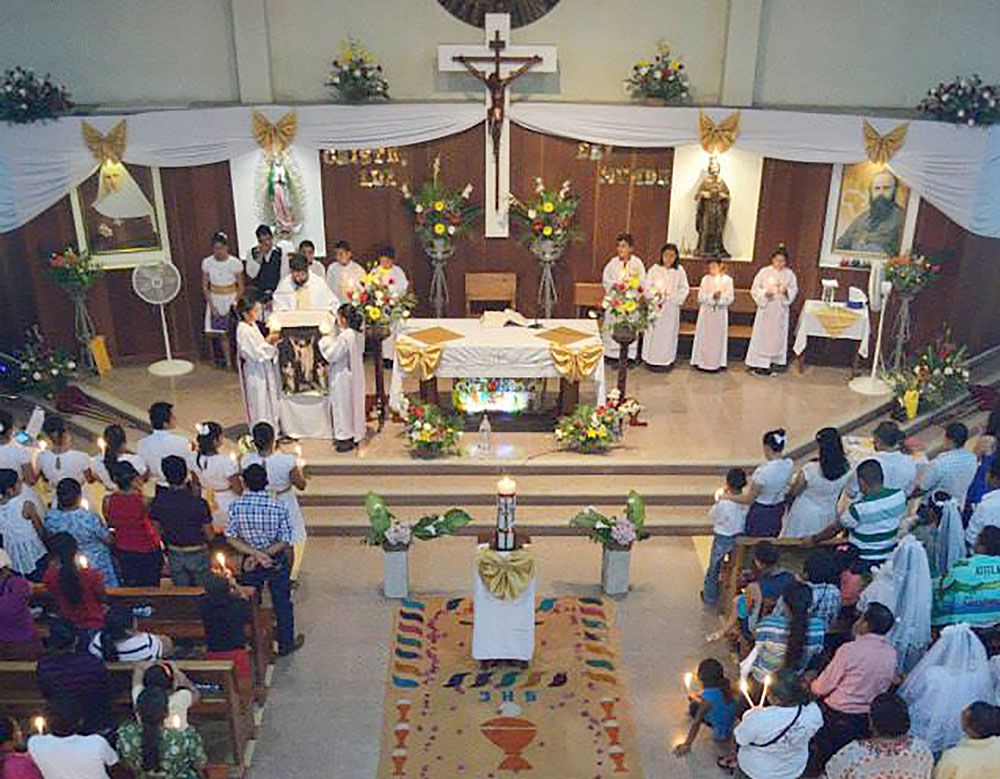The apostolic Church. Where does this particular word come from? The word itself cannot be found in the texts of the Bible, but what we mean by it certainly comes from the very person of Jesus, from His words and deeds and, of course, from the teachings and the actions of His Apostles.
Already in the first decades of the life of the early Christian communities, people started using this word to speak about the Church and its members. For the very first time, we also find the word ‘apostolic’ referring to the Church in a letter written by Saint Ignatius, bishop of Antioch in Syria, to the Trallians while he was on his way to Rome where he suffered martyrdom, killed by the beasts, probably in the Coloseum in the year 107.
The second time we find this word is in the Martyrdom of Polycarp. Here, Polycarp himself is called ‘apostolic.’ He was the bishop of Smyrna until around the year 155. (Smyrna is today called Izmir, a city on the west coast of Turkey.)
The most important reference to this term is in our Creed which was decisively shaped in the Council of Nicea (325) though, at that time, the text ended with the words.. “and (we believe) in the Holy Spirit.” The part that we continue to recite today: “… the Lord, the Giver of Life, and in the one….. apostolic Church…” was officially included there by the Council of Constantinople in the year 381, though the council fathers probably took the words from an earlier document written around 374 by Epiphanius, bishop of Salamis on the island of Cyprus.
‘Apostolic’ In The New Testament
The word is not there, but those who began to use it certainly did so to say that both what we believe in, as Christians, and also much in our way of living, as a Church, certainly come from Jesus and His Apostles.
We could say that the first ‘apostolic person’ in the New Testament is Jesus Himself. The word comes from the Greek verb apostellein which means to send. We remember, at once, that Jesus used the words of Prophet Isaiah to introduce Himself to His contemporaries in the synagogue of Nazareth – precisely as the One who has been anointed by the Spirit of God and sent (Lk. 4:18). The idea that He was sent by the Father is clearly seen as the main motivation behind everything that Jesus said and did. No wonder that the author of the Letter to the Hebrews will call Jesus ‘Apostle and High Priest of the faith that we profess’ (Heb. 3:1).
But Jesus is not the only one sent. From the very beginning of His mission, He extended to His disciples this fundamental dynamics of His own intimate life: “As the Father sent me, so I’m sending you” (Jn. 20:21). After His death, His every appearance to His disciples ends with words or gestures that send them (e.g. Jn. 20:17–18). And His disciples will forever remember as the last message of Jesus the words with which He sent them to the whole world: “Go and make disciples…” (Mt. 28:19).
And I Am With You Every Day
Jesus accompanies those He sends. In fact, those who are sent (apostles) do not take leave of Jesus who’s sending them. His words couldn’t possibly be clearer: “And I am with you every day, until the end of the world” (Mt. 28:20b). He had already promised that He would not leave them on their own since the Holy Spirit, whom the Father would send to them in His Name, would continue to teach them and to remind them of everything Jesus had told them (cf. Jn. 14:26). So, the apostle, who is sent, does not replace Jesus who sends him; rather he becomes His visible presence: “Those who will listen to you will listen to me, and those who will despise you will be despising me” (Lk. 10:16). The apostles are sent not to represent Jesus as if He was an absent person; with their words and gestures of faith, and with the concrete witness of their daily life, the apostles render Jesus present and active wherever they go. Through the apostles, people were, in fact, encountering the person of the Risen Jesus, mysteriously present, so much so that they could even work miracles in His Name, like the one we are told of by Luke in the third chapter of the Acts of the Apostles: the paralytic beggar sitting at the gate of the temple of Jerusalem looks at Peter and John passing by and asks for some coins, but he gets a lot more than that “I do not have silver or gold, but what I have I give you: in the Name of Jesus Christ, the Nazarene, get up and walk,” and the man recovered his physical health and his human dignity as a child of God (Acts 3:6). Many years later, Paul still felt that very strongly when he exclaimed: “It is no longer I who live, rather it is Christ who lives in me” (Gal. 2:20).
Thus, looking at the New Testament, we can say that Jesus Himself was apostolic (sent), and so were His first disciples, rightly called ‘apostles.’ It is good to note, at this point, that, in the Church, we got used to calling the first communities of disciples, formed in the decades immediately after the resurrection of Jesus, ‘apostolic’ not just because they were founded by one of the Apostles and lived at the same time in history, but also because those communities shared in the ‘apostolic character’ of those who had founded them. Not only were they connected with the Risen Jesus through their contact with the group of the Apostles, but they themselves shared in the same mission. They, too, felt they were sent to render the Lord present and active in their words, in their celebrations (especially the Eucharist) and in their way of living. Here, we find the real reason why, in time, the whole Church is officially called ‘apostolic.’
The Link With The Origins
To have an ‘apostolic origin’ is a basic characteristic of every true Christian Church in the world. Faith in Jesus Christ, together with the specific way of living that it generates, is not the simple result of human projects. It is always a gift that comes from God Himself through the Apostles. It was to them that Jesus entrusted His Gospel. They were the ones who lived with Him, sat at His table; they were there when He died on the cross and they were the ones who saw Him alive after He rose from the dead on Easter Day (cf. Acts 1:21–22). Finally, they were the ones over whom He breathed His Holy Spirit, entrusting them with His Gospel and with His mission of forgiveness and reconciliation (Jn. 20:19–23). Our faith comes from the witness they left us. Every Christian feels called to ‘receive by listening, and to observe’ what the Apostles taught (cf. Lk. 11:28). With the passing of time, elders were appointed by the Apostles to guide the various communities; they were entrusted with this very special ‘deposit of faith’ which they were supposed to receive and transmit faithfully. Shortly before his death, amidst persecutions in Rome, the Apostle Paul spells that out very clearly in his first letter to Timothy, the elder (bishop) in charge of the community of Ephesus: “…keep what has been entrusted to you” (1 Tm. 6:20).
Receiving the Gospel and the Christian tradition from the Apostles of Jesus and their successors assures us that the Gospel we are following and announcing is truly the Gospel of Jesus and not some human invention. In times of uncertainty caused by great changes or by the difficulties the Church is facing, it is important to go back to the gospels and to the other books and letters of the Apostles in the New Testament. It is there that we find, the most solid, sure, and lasting orientation for each one of us, personally and for our communities, as followers of Jesus (cf. Rev. 22:18).
Apostolic Life In History
In the Roman Catholic Church, we can see from the uninterrupted list of the bishops of Rome, starting from the Apostles Peter and Paul themselves, the assurance that the ancient ‘deposit of faith’ was handed down from the Apostles to our present time. But even if the historical link with the Apostles is probably sure here, as it is also in several other Churches founded by the Apostles, this does not mean that all the particular external forms of life that the Church assumed in history have the same ‘apostolic character.’ In fact, we have seen the ways ecclesial communities organize themselves as historical and social conditions change.
All along the history of the Church, we find groups of Christians that chose to live a particular form of consecrated life in an effort to adopt new ways of living an ‘apostolic life’ suitable to their own times. We can think of the monks in Egypt who went out into the desert, or the communities of St. Benedict and St. Scholastica that wanted to promote a true apostolic way of life based on work and prayer in community life. Later on, St. Francis and St. Clare of Assisi and St. Dominic led new groups of consecrated men and women who wanted to stress the poverty of Jesus and His disciples as an essential element of that ‘apostolic life’ that makes true disciples of Jesus. In the nineteenth century, we saw the rise of a large number of missionary congregations and institutes, among them the Comboni missionaries. In a wonderful variety of ways, they claimed, in new and radical ways, the apostolic legacy of Jesus: ‘You shall be my witnesses in Jerusalem, … till the ends of the earth’ (Acts 1:8).
Being an apostolic Church is then not just a question of having a direct historical link with the Apostles of Jesus. It is also a question of experiencing and living in every historical context what the first group of Apostles experienced and how they lived with Jesus at the beginning.
Being Apostolic Today
In the light of what has just been stated, we can go on to say that the apostolic character of the Church has to do not only with her origins but also with her way of living today. We can think of the many forms of consecrated life that are springing up in the Church today, or of the many different ways of announcing the Gospel of Jesus to the people of our time. They did not exist in the past. Thus, far from just copying what was there at the beginning, in the first communities after the Resurrection of Jesus, the basic elements of the ‘apostolic life’ find new expressions in the Church, according to the demands of specific historical, cultural, religious … contexts in which the various Christian communities are called to live with Jesus, to listen anew to His Gospel, to witness to it with their lives, and to proclaim it to others.
The basic constitutive elements of that ‘apostolic deposit’ – the great Tradition of the Church transmitted down the centuries, which Paul was writing about to Timothy, remain unchanged. Think of the Gospel of Jesus, of the Church as a visible and organized community, think of the ordained ministry and of the mission to evangelize and to promote the values of the Kingdom, think of the sacraments, …to mention just a few.
But apostolic fidelity does not mean mere ‘frozen’ repetition. In every age and in every new human context, the Spirit of Jesus helps us to discover new dimensions in some of those basic elements. We may think of the new ways of understanding and celebrating the Eucharist after the Second Vatican Council with the new emphasis on the active participation of the whole liturgical assembly. We may think also of the ‘fundamental option for the poor,’ which the episcopal assemblies of Medellín (1968) and Puebla (1975) in Latin America helped us to rediscover, – a basic criterion for the authenticity of the whole mission of the Church in the world (cf. LG 8b).
Finally, let me note, even if very briefly, that to be truly ‘apostolic’ in our Church communities, we need to commit ourselves to promote wide-ranging unity and reconciliation in the Church and in the world. The prayer of Jesus is a constant reminder, to be faithful to the ‘apostolic deposit’ we received: “That they may all be one, even as you, Father, are in me and I am in you; they also may be in us, that the world may believe that you have sent me” (Jn. 17:21).















